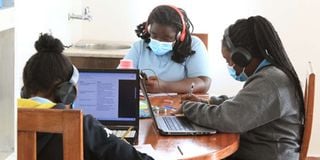Premium
School ‘breaks’ classroom walls, goes the online way

Students in a google class at Hampton Online School in Nanyuki on January 19, 2021. The school has tapped into online platform as a new way of learning hence avoiding the high cost of operating normal schools.
What you need to know:
- Hampton School went fully online in April last year, one month after learning institutions were closed due to Covid-19.
- None of the students attends in-person classes.
A school in Nanyuki has smashed classroom walls after it transformed into a fully-fledged online learning institution.
Hampton School went fully online in April last year, one month after learning institutions were closed due to Covid-19. None of the students attends in-person classes.
The 10 girls and 10 boys who require boarding facilities are hosted at an apartment block in the suburbs of Nanyuki town. They all have computers and attend online classes from various rooms.
Another 40 are learning remotely from their homes, including a Kenyan student who takes lessons from Dubai. Forty students are doing the International General Certificate of Secondary Education (IGCSE) British curriculum and 20 are in the 8-4-4 education system and Competency-based Curriculum (CBC). They use Google Classroom for lessons.
Google Classroom has a free web-based service developed by Google and that aims to simplify creating, distributing, and grading assignments. It can accommodate a minimum of 160,000 students and monitor their progress.
School chairman Tony Mwite tells Nation they took to the cyberspace to cushion students and parents hard hit by the effects of the coronavirus pandemic.
“After the closure of schools, we wondered whether we had the financial muscle to be able to reopen. Reopening alone required a lot of capital because it entailed registration of buses, paying for insurance, fuelling, and paying NTSA licence fees. We also factored in the hiring of teachers, repainting the premises and adhering to the Covid-19 guidelines issued by the Ministry of Health,” Mr Mwite says.
Online school
“We thought of resuming learning by keeping business out of school. Last year, we were temporarily online and discovered that we had adequate strengths as a school. Therefore, we resolved to have a permanently online school,” he says, adding that 15 teachers had been brought on board to engage the students online.
The 8-4-4 candidates have been registered with the Kenya National Examination Council (Knec) and will sit their exams at various examination centres as private candidates. Those studying the British curriculum will sit their exams in nearby centres.
Ms Stefanie Mwite — a director at the school — believes in competency-based pedagogy, where she focuses on individual learners and helps them excel.
“The education sector has over the years been the slowest to change and what we’re witnessing now is the next phase of education where we have broken down the walls of the classrooms and fully embraced technology,” she says.
Ms Mwite adds that the new learning model has not only enabled teachers to be creative, but also boosted their income.
“When you are teaching online, you cannot just be a talking head because the students will switch you off. Previously, we used to sit in the classrooms and demand the students to keep quiet and listen to lectures in a monotone mode, but this has changed because teachers are required to be creative,” she says.
Online learning has helped parents save money because they are not required to buy physical textbooks for their children.
Weeding out cartels
The platform, Ms Mwite says, has also helped in weeding out cartels in the education sector that charge exorbitant fees.
“People will soon start recognising teachers as resourceful commodities. A teacher will henceforth not be waiting for a monthly salary since he or she can charge per hour and teach three or four online lessons. We appreciate the government for injecting more resources to the online learning platform and giving them to schools,” the director says.
Farstelia Makena, 13, is in Year Eight of IGCSE. The bold and eloquent student says that online learning during the pandemic has helped her continue with her schooling uninterrupted and sharpened her skills.
“It has helped me as a student with my schooling because there are many children out there who have been disadvantaged due to Covid-19. I’ve got a head-start even though some students out there are starting all over again with a lot of pressure because they have been out of school for a long time,” she says .
Makena affirms that technology has helped her in amassing more skills in academics.
“The teachers are fun during classes. We watch videos, interact better and meet new people globally. We do projects together and sharpen our skills,” she says.
The director says: “Nanyuki was a place of choice to set up the school because it has modern infrastructure and the environment is serene for learning.” The institution looks forward to expanding in other parts of the continent and the world.





